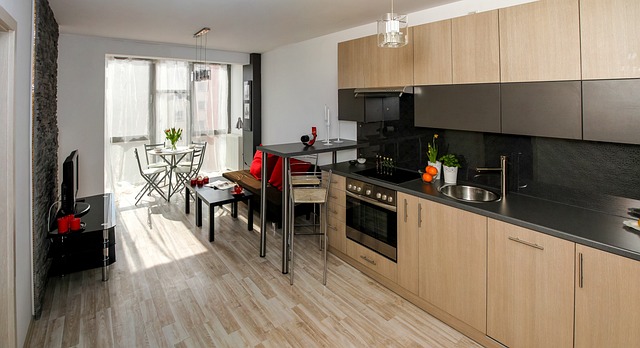Pet Policies in Albany Apartments: Finding Feline & Canine Friendliness

Pet policies in Albany apartments vary widely, impacting tenant rights and responsibilities. Some complexes charge deposits or limit pet types and num…….
In today’s urbanized world, the relationship between humans and their furry (or feathered) companions is stronger than ever. As cities evolve, so do the policies surrounding pet ownership, particularly within apartment communities. This article delves into the intricate world of pet policies in Albany apartments, exploring how these regulations shape the lives of residents and their pets. We will navigate through various aspects, from historical perspectives to global trends, economic influences, technological innovations, and the legal frameworks that govern this unique segment of urban living. By the end, readers will gain a comprehensive understanding of the significance and impact of pet policies in shaping the residential landscape of Albany.
Pet policies in Albany apartments refer to the set of rules, regulations, and guidelines established by apartment complexes or landlords to govern the presence and care of pets within their premises. These policies encompass a range of considerations, including pet types allowed, size restrictions, behavior guidelines, pet registration, vaccination requirements, noise control, and liability coverage. The primary goal is to maintain a harmonious living environment for all residents while accommodating the needs of pet owners.
Key Components:
Pet Types and Restrictions: Policies often specify the types of pets permitted, such as dogs, cats, or even birds. Some apartments may allow exotics like reptiles or small animals, while others may ban certain breeds considered potentially dangerous.
Size and Weight Limits: To manage space constraints, many policies implement size restrictions based on weight or height. This ensures that smaller units can accommodate pets without overwhelming the living area.
Behavioral Guidelines: Residents are expected to ensure their pets are well-behaved and do not disturb other tenants. This includes rules against aggressive behavior, excessive barking, or unleashed pets in common areas.
Registration and Documentation: Owners may be required to register their pets with the apartment management, providing details like pet name, breed, age, vaccination records, and liability insurance information.
Vaccination and Health Requirements: To prevent the spread of diseases, some policies mandate vaccinations for common pet illnesses. This ensures a healthier community for both residents and pets.
Noise Control: Managing noise is crucial in multi-dwelling units. Policies often include guidelines on pet-related noise, encouraging owners to train their pets not to disturb neighbors at unreasonable hours.
Liability and Insurance: Landlords may require pet owners to carry liability insurance to cover potential damage or injuries caused by their pets. This protects the landlord and ensures responsible pet ownership.
Pet policies in Albany apartments are not isolated phenomena; they are influenced by global trends and cultural shifts towards pet companionship. Here’s an overview of its international impact:
North America: The United States and Canada have seen a consistent rise in pet ownership, leading to more comprehensive pet policies in apartments. Many cities, including Albany, have adapted to accommodate this trend, resulting in varied policy approaches across regions.
Europe: European countries generally favor pet-friendly housing, with many landlords considering pets as part of the family. Amsterdam and Berlin, for instance, have progressive policies allowing a wide range of pets, while some cities in France have stricter regulations.
Asia: In rapidly urbanizing Asia, pet ownership is growing, particularly in metropolitan areas like Tokyo and Singapore. However, cultural differences and limited space often lead to more stringent policies, focusing on smaller, domesticated species.
Emerging Markets: Countries in Latin America and Africa are experiencing a surge in pet adoption, influencing local apartment policies. As these regions urbanize, pet-friendly amenities are becoming increasingly common.
The economic landscape plays a pivotal role in shaping pet policies in Albany apartments, reflecting the broader market dynamics and investment trends. Here’s an analysis of its impact:
| Economic Factor | Effect on Pet Policies |
|---|---|
| Demand for Urban Living: The growing preference for urban apartments drives landlords to cater to pet owners, resulting in more inclusive policies to attract residents. | Pet-Friendly Amenities: Landlords invest in pet-related facilities like dedicated play areas, pet washing stations, and grooming services to enhance the living experience. |
| Rental Market Competition: In competitive rental markets, unique selling points are essential. Pet-friendly apartments gain an advantage, leading to more relaxed policies to differentiate offerings. | Targeted Marketing: Advertisements often highlight pet-welcoming features, appealing to a broader range of potential tenants, including pet owners. |
| Investment Returns: Positive experiences with pet-friendly housing can increase property values and tenant retention rates, ensuring long-term investment returns. | Policy Flexibility: Landlords may be more inclined to offer tailored policies, considering individual pet needs, which can enhance resident satisfaction. |
| Local Regulations: Local laws and zoning ordinances can either restrict or encourage pet ownership, influencing the policy frameworks implemented by apartment complexes. | Compliance Costs: Adhering to local regulations may incur additional expenses for landlords, potentially impacting policy decisions and tenant charges. |
Technology has revolutionized various aspects of our lives, and pet policies in Albany apartments are no exception. Here’s how technological advancements are shaping this domain:
Online Pet Registration: Digital platforms allow residents to register their pets online, streamlining the process and reducing paperwork. This enhances data security and accessibility for management.
Pet Health Apps: Mobile applications provide pet owners with tools to manage vaccination schedules, medication reminders, and health records. Some apps even offer remote training features, promoting well-behaved pets.
Smart Home Devices: Integrating smart home technology enables pet owners to monitor their pets remotely through cameras and sensors. This can improve pet safety and provide peace of mind for owners away from home.
AI-Assisted Noise Detection: Artificial intelligence algorithms can analyze noise patterns, helping management identify noisy pets and communicate with owners for training purposes.
Virtual Pet Care Services: On-demand pet care services, facilitated by technology, offer convenient solutions for busy pet owners. This includes virtual consultations, automated feeding systems, and remote pet monitoring.
The development of pet policies in Albany apartments is guided by a web of legal frameworks and regulatory bodies that ensure fair and safe housing practices.
Landlord-Tenant Laws: These laws establish the rights and responsibilities of landlords and tenants, including provisions for pet ownership. Tenants have the right to peaceful enjoyment of the premises, while landlords can impose reasonable restrictions.
Local Zoning Ordinances: Each municipality has its own zoning regulations that may impact pet policies. For instance, some areas restrict certain breeds or sizes, while others mandate specific licensing requirements.
Health and Safety Codes: Local health departments often provide guidelines for pet-related health and safety, particularly regarding disease prevention and animal welfare.
Fair Housing Act: In the United States, the Fair Housing Act prohibits discrimination based on disability, including assistance animals. This has implications for pet policies, especially regarding service animals.
Pet Liability Insurance: Some regions require landlords to carry liability insurance covering pet-related damages, ensuring financial protection for both owners and landlords.
Despite the benefits of pet policies in Albany apartments, several challenges and criticisms have emerged that demand attention and innovative solutions:
Ununiform Policies: The lack of standardization across apartment complexes can lead to confusion and inconsistent experiences for pet owners. A unified approach could ensure fair treatment and clear expectations.
Discrimination against Certain Breeds: Some policies disproportionately target specific dog breeds, often based on misconceptions or fears. This requires a nuanced approach, considering individual behavior rather than breed stereotypes.
Noise Perception: Determining acceptable noise levels is subjective, leading to disputes between neighbors. Implementing technology for noise monitoring and mediation can help resolve these conflicts.
Liability Concerns: Landlords may be reluctant to allow pets due to potential liability issues. Educating landlords about responsible pet ownership and offering comprehensive insurance options can alleviate these fears.
Access to Green Spaces: In densely populated urban areas, limited access to outdoor spaces can impact pet welfare. Encouraging community initiatives for pet-friendly parks and trails can mitigate this challenge.
Overview: A prestigious high-rise apartment complex in downtown Albany embraced pet-friendliness as a unique selling point, attracting a diverse range of residents.
Policy Approach: They implemented an all-inclusive policy, allowing various pets with size and breed restrictions. Dedicated amenities included a rooftop dog park, pet washing stations, and regular pet training workshops.
Results: The complex experienced high tenant retention rates and waiting lists. Residents praised the community atmosphere fostered by shared pet spaces. However, noise concerns led to an app-based mediation system for quick resolutions.
Lessons Learned: A balanced approach that accommodates pets while addressing community needs is key to success. Technological interventions can enhance policy effectiveness.
Setting: An apartment community located in a suburban, rural area with ample green spaces.
Policy Focus: The management prioritized pet welfare by offering large, fenced-in yards for each unit, catering to active breeds. They also established a community garden and organized regular pet-focused events.
Impact: This approach attracted families with larger pets, fostering a strong sense of community. The rural setting provided natural noise buffers, reducing disputes.
Strategic Considerations: Understanding the local environment and resident preferences is crucial for successful policy implementation.
The realm of pet policies in Albany apartments is poised for growth and evolution, shaped by emerging trends and changing societal norms:
Sustainable Pet Living: Eco-conscious landlords may incorporate sustainable practices, such as organic pet food options, eco-friendly pet waste management, and energy-efficient amenities.
Pet Wellness Centers: Integrating pet grooming, veterinary care, and wellness services within apartment complexes can provide convenience and promote pet health.
Virtual Community Engagement: With technology advancements, online platforms can facilitate virtual pet-focused events, fostering connections among residents and their pets.
Personalized Pet Experiences: Customized policies catering to individual pet needs, such as specialized training programs or dietary accommodations, will gain popularity.
Pet-Centric Architecture: Future apartment designs may incorporate dedicated spaces for different pet activities, reflecting the growing importance of pets in urban living.
Pet policies in Albany apartments represent a dynamic intersection of urban living, animal welfare, and community management. As cities continue to evolve, these policies will remain integral to creating harmonious and inclusive residential environments. By adapting to global trends, embracing technological advancements, and addressing challenges through innovative solutions, apartment complexes can enhance the overall quality of life for residents and their beloved pets.
Q: What if my pet has a history of aggression? Can I still live in an apartment that allows pets?
A: While some policies may have strict restrictions, many landlords consider cases individually. Providing evidence of successful training and behavior modification can increase your chances of approval.
Q: Are there any laws protecting service animals in apartments?
A: Absolutely! The Fair Housing Act guarantees the right to live with service animals. Landlords must accommodate these animals unless they pose a direct threat or significant inconvenience.
Q: How can I ensure my pet doesn’t disturb neighbors?
A: Train your pet using positive reinforcement methods, and consider setting clear boundaries. Regular communication with neighbors and managing noise through training can help maintain peaceful coexistence.
Q: Can pet policies vary based on the apartment’s age and location?
A: Yes, older buildings may have more stringent policies due to structural considerations. Location also plays a role; urban areas might have different approaches than suburban or rural communities.
Q: What are some creative ways to manage pet waste in apartments?
A: Implement pet waste stations with bag dispensers and encourage residents to adopt “poop scoop” campaigns. Some complexes use innovative technologies like automatic waste compactors for efficient management.

Pet policies in Albany apartments vary widely, impacting tenant rights and responsibilities. Some complexes charge deposits or limit pet types and num…….

Pet owners seeking Albany housing should focus on understanding apartment pet policies, comparing terms for breed restrictions, size limits, and fees……..

Low-income renters in Albany seeking pet-friendly apartments face varied policies across complexes, from breed restrictions to dedicated play areas. U…….

Pet policies in Albany apartments vary widely between buildings, covering breed restrictions, size limits, pet deposits, and more. Researching these p…….

Pet policies in Albany apartments vary widely, covering breed restrictions, size limits, and pet numbers per unit. To find pet-friendly rentals, searc…….

Understanding Albany apartment pet policies is crucial for a smooth search. These include breed restrictions, size/number limits, deposits/fees, and a…….

Understanding pet policies in Albany apartments is vital for finding low-income housing that accommodates pets. Albany offers many cat-acceptable and…….

When renting in Albany, understanding pet policies is vital. Landlords have varying restrictions on pets' types, sizes, and numbers, with fees or…….

In Albany, pet insurance is crucial for apartment residents navigating breed restrictions and size limits. Landlords are embracing pet-friendly polici…….

Albany's charming neighborhoods offer walkable areas with pet-friendly complexes. Understanding apartment pet policies is key; many have restrict…….